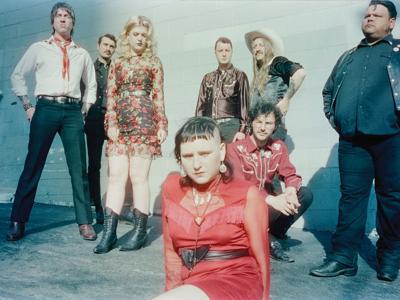Portland, Ore.’s Roselit Bone lives comfortably in the spaces between punk, ranchera and country and Western. The band grew gradually from a duo to an eight-piece juggernaut, complete with strings and horns. With grandiose gothic lyrics and big arrangements, Roselit Bone’s music crackles with the tension of thunderheads far on the desert horizon.
On the band’s latest album Ofrenda — released Aug. 25, it shares its name with the altars that Mexican families have traditionally set up in their homes to honor the dead during Día de los Muertos — frontwoman Charlotte McCaslin offers a small ray of hope among the tumult of contemporary life. Ofrenda encapsulates many contradictions: Divorce, death, pandemic and police violence form a backdrop to the beginnings of McCaslin’s new relationship and her transition. Ofrenda seeks to make sense of this duality. Ahead of a tour stop at Springwater, McCaslin spoke with the Scene about her musical influences, Roselit Bone’s evolution and her newfound sense of self.
Country music is often about individualism and a very personal style of songwriting. Your music paints these very epic pictures with a spaghetti Western sound. How does that style speak to you?
I do feel like my songwriting is personal in a lot of ways and is very informed by my own life experiences. I have been through a lot. It might be a little more than the usual country affair, perhaps.
I think that in order to get the full scope of the emotions that I’m going for, I draw on a lot of different influences, and some cinematic influences to drive home the scope of whatever the song is about — whether it’s a personal song, or something that’s more of a storytelling thing.
It varies by song. Some songs are definitely story songs, but even a lot of those stories are directly informed by things that I experienced or witnessed. Western music is very good at conveying loneliness, and a hardened take on how you deal with pain, and that goes hand in hand with the songs that I write.
You experienced those feelings when you moved to a town in rural Oregon.
A lot of our early songs were written when I lived out in the woods. I lived out in rural Oregon for about a year, and there were no jobs around. I had to find scrap metal to sell and try to get a job at the fishery.
It was pretty hard living out there. My only real escape was just playing music 10 hours a day in this little shack that we lived in. Those early songs were the most lonely of the batch that I’ve written. As I started arranging them a couple of years later for a band, the cinematic and atmospheric traits of Western music helped drive that loneliness through everything that I was trying to do. Even though at times the vocal delivery can be very heart-on-my-sleeve, the background of Western music is often very cold and inhuman-sounding. I think that helps provide a contrast.
When you moved to Portland, Roselit Bone began as a duo. How did the band evolve?
All the songs were written as folk songs, and I think I still work in that way — where I make sure that the song works as a solo piece before I let the band hear it. Early on, I was really influenced by Delta blues and ragtime guitar, which have a lot of moving parts in them. I started to hear parts that I couldn’t play. We added a bassist and continued adding members with violin and trumpets, keyboards, synths, drums, bass, and, like, six guitars. [Laughs] When I hear an influence in a song that I’m writing, I absolutely try to pursue it. If that means adding instruments, or going in a [different] stylistic direction, I follow whatever the song is.
You grew up around mariachi music in California, and it’s a big influence on Roselit Bone. Have you done any study of it?
Just casually. I listen to it a lot. I have a lot of ranchera records. There’s a handful of ranchera artists that I adore, like Miguel Aceves [Mejía], Javier Solís — and Chavela Vargas is one I’m the most influenced by. I have learned to play a lot of the songs.
What we do is not in any way an authentic version of any of that, but we do use some of the same instrumentation, and I play a fairly unique guitar that is only used in certain regional styles of Mexican music: I play a requinto and not a normal classical guitar, which adds to the sound.
A lot of what people consider “spaghetti Western” music, when talking about cinematic stuff — a lot of the horn arrangements are drawn from mariachi and ranchera. When I started making music, I wasn’t necessarily trying to make Western music, but I was drawing from a lot of the same influences that Ennio Morricone did. I was really drawn to twangy, Duane Eddy guitar and ranchera string and trumpet arrangements, and the strong operatic vocals that come from a lot of Mexican music.
After your previous record, 2019’s Crisis Actor, you transitioned. How has that changed your relationship with your music and performing?
Most of my songs, though extremely personal before, always felt like I was singing from a character’s viewpoint, like I was performing as a man. Since transitioning, everything is a little closer to my heart. I have very few blocks in my songwriting now. I do think that it has softened some of the violent edges of my lyrics. The newer music doesn’t have the same hopelessness or inner turmoil as before. I’m just trying to play music that’s as authentic to how I feel now, and what I want to make now, as I can.





